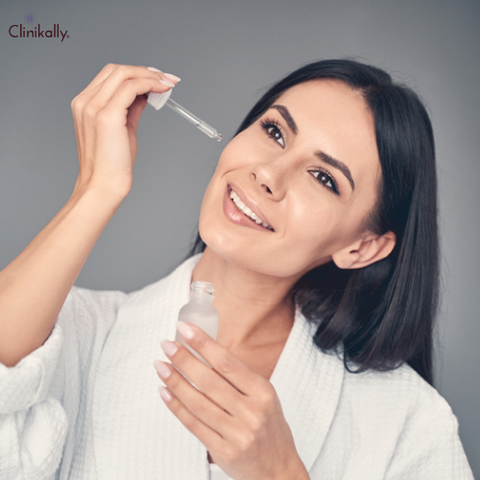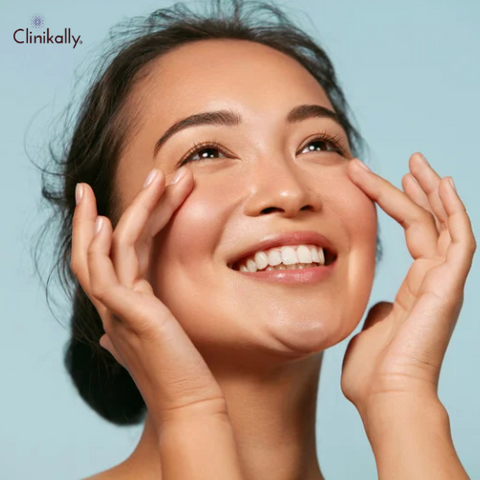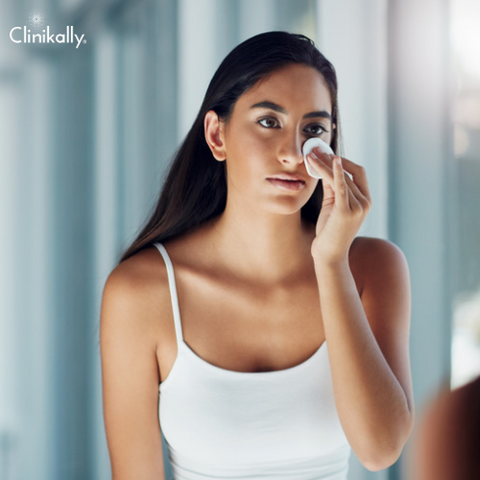Although both retinol and bakuchiol are well-known skincare ingredients for minimizing the appearance of fine lines and wrinkles, their mechanisms of action differ slightly. Retinol and bakuchiol are both powerful ingredients for enhancing skin texture and lessening the visibility of fine lines and wrinkles. Retinol is extremely effective but can irritate some people, whereas bakuchiol is typically kinder and less likely to aggravate. To avoid irritation, choose the ingredient that works best for your skin type and use it as directed.
The Basics: Bakuchiol vs. Retinol

Bakuchiol and retinol are both skincare ingredients with anti-aging and skin rejuvenation properties. There are, however, some significant differences between the two. Vitamin A derivative retinol is a potent component of skincare products designed to fight aging. It reduces the visibility of fine lines and wrinkles by boosting cell turnover and stimulating collagen production. It can, however, cause skin irritation, redness, and sensitivity, especially in those with sensitive skin. Bakuchiol, on the other hand, is a naturally derived ingredient from the babchi plant. It has been found to have anti-aging properties comparable to those of retinol without the risk of adverse effects. Bakuchiol is also less potent than retinol, so results may take longer to appear. Those with sensitive skin, on the other hand, are thought to tolerate it better. Both bakuchiol and retinol have anti-aging properties; however, retinol is more potent but may cause skin irritation and sensitivity, whereas bakuchiol is gentler on the skin but may take longer to see results. Finally, the decision between the two comes down to personal skin type and preferences.
Bakuchiol: The Natural Powerhouse
Due to its powerful anti-aging properties, the natural ingredient bakuchiol has recently gained popularity. Bakuchiol, which is made from the seeds of the babchi plant, is frequently referred to as a "natural retinol alternative" because it offers the same advantages as retinol without the risk of adverse effects. Bakuchiol can increase collagen production to maintain firm and supple skin. The protein collagen, which gives skin its elasticity, is depleted as we age, which results in wrinkles and fine lines. Bakuchiol has been shown to boost collagen production, which results in smoother, firmer skin. Bakuchiol also has antioxidant properties that help protect the skin from free radical damage. Free radicals are unstable molecules that cause oxidative stress and skin damage, resulting in premature aging. Bakuchiol, by neutralizing free radicals, helps to prevent this damage and promote healthy, youthful-looking skin. The fact that bakuchiol is well tolerated by people with sensitive skin is another benefit of the substance. Bakuchiol is gentler on the skin than retinol, which can cause irritation and redness, making it an excellent choice for those with sensitive or easily irritated skin. bakuchiol is a natural powerhouse ingredient that can provide similar anti-aging benefits to retinol without the potential side effects. It is well-tolerated by most skin types and can help support healthy, youthful-looking skin.
Retinol: The Classic Skincare Hero
Retinol is a skincare hero that has been used for decades to treat a variety of skin issues. It is a vitamin A derivative that has been demonstrated to boost collagen production, increase cell turnover, and lessen the visibility of fine lines and wrinkles. One of the most important advantages of retinol is its ability to increase cell turnover. Our skin's natural exfoliation process slows down as we age, resulting in a build-up of dead skin cells, clogged pores, and dull skin. Retinol aids in the acceleration of this process, resulting in brighter, smoother, and more evenly toned skin.
Retinol is required to promote collagen synthesis and maintain firm, youthful-looking skin. Collagen is a protein that gives skin its elasticity, and as we age, our collagen levels decrease, causing wrinkles and fine lines to form. Retinol promotes collagen production, which results in smoother, firmer skin. Another advantage of retinol is its ability to treat a variety of skin issues, such as acne, hyperpigmentation, and uneven skin texture. It can aid in the unclogging of pores, the reduction of inflammation, and the fading of dark spots and scars, resulting in clearer, more even-toned skin.
While retinol is a powerful ingredient, it can be irritating to some skin types, especially those with sensitive skin. To reduce the risk of irritation, start with a low concentration and gradually increase it over time. Overall, retinol is a classic skincare hero that can help with a variety of skin issues. It is a popular option for people who want healthy, youthful-looking skin because of its capacity to stimulate collagen production, increase cell turnover, and treat acne and hyperpigmentation.
Comparing the Benefits and Concerns

It is important to take into account both the similarities and differences between bakuchiol and retinol when contrasting their benefits and drawbacks.
Bakuchiol's advantages include:
-
stimulates the production of collagen
-
Protects the skin from free radicals by having antioxidant properties.
-
Suitable for people with sensitive skin
-
can offer the same anti-aging advantages as retinol without the risk of adverse effects.
Issues with Bakuchiol:
-
Compared to retinol, results could take longer to appear.
-
Studies suggest that in terms of boosting collagen production, it might not be as effective as retinol.
Advantages of retinol:
-
Increases cell turnover, resulting in skin that is more even-toned, smoother, and brighter.
-
Encourages the production of collagen, which produces smoother, firmer skin.
-
Take care of a wide range of skin issues, such as hyperpigmentation and acne
-
Efficacy demonstrated in numerous studies
Retinol concerns:
-
Some skin types, especially those with sensitive skin, may find it irritating
-
Can result in peeling, dryness, and redness.
-
Can increase the skin's sensitivity to sunlight, necessitating daily use of sunscreen.
In conclusion, bakuchiol and retinol each have their own set of advantages and disadvantages. If you have sensitive skin or are looking for a natural alternative to retinol, bakuchiol is a great option. However, it may take longer to see results and may be less effective in increasing collagen production than retinol. Retinol, on the other hand, is a tried-and-true ingredient that can help with various skin issues, but it can also be irritating and necessitate additional sun protection. Finally, the decision between the two comes down to personal skin type and preferences.
Anti-Aging Effects: Wrinkles and Fine Lines
Both bakuchiol and retinol can help to reduce the appearance of wrinkles and fine lines, which are two of the most common signs of ageing. Bakuchiol has been shown to increase collagen production, which aids in skin elasticity and the appearance of wrinkles and fine lines. According to a 2018 study published in the British Journal of Dermatology, bakuchiol was just as effective as retinol at reducing the appearance of fine lines and wrinkles, but without the associated side effects like irritation and dryness.
It has been demonstrated that the anti-aging ingredient retinol can lessen the appearance of wrinkles and fine lines. It works by increasing cell turnover and stimulating collagen production, which helps to reduce the appearance of wrinkles and fine lines. However, it can cause skin irritation and sensitivity, especially when first used, which is a concern for those with sensitive skin. Overall, both retinol and bakuchiol are effective in reducing the appearance of wrinkles and fine lines, but bakuchiol may be a gentler option for those with sensitive skin. It's important to keep in mind that consistency and patience are key when using either ingredient for anti-aging effects because it might take several weeks to see results.
Skin Cell Turnover and Collagen Production
Bakuchiol and retinol have both been shown to increase skin cell turnover and collagen production, both of which are important factors in maintaining healthy, youthful-looking skin. Bakuchiol has been shown to boost collagen production, which aids in skin elasticity and the appearance of fine lines and wrinkles. It also promotes skin cell turnover, which can help improve skin texture and tone. A 2014 study that appeared in the International Journal of Cosmetic Science indicated that bakuchiol may be used as an anti-aging ingredient because it increased the production of collagen in human skin cells.
Retinol is also known to increase collagen production and skin cell turnover. Retinol can improve skin texture and tone by promoting the shedding of dead skin cells and the production of new ones. It also stimulates collagen production, which aids in the reduction of fine lines and wrinkles. It can, however, be irritating and drying to some skin types. Overall, bakuchiol and retinol have been shown to increase skin cell turnover and collagen production, which can help to improve skin health and appearance. Bakuchiol may be a more gentle option for those with sensitive skin, whereas retinol is a well-known ingredient with proven efficacy. It's important to start with a low concentration and gradually increase use over time to minimize the risk of irritation with either ingredient.
Acne Treatment and Prevention
Because of its ability to increase skin cell turnover and unclog pores, retinol has been a go-to ingredient for treating and preventing acne for decades. Retinol can help prevent acne by promoting the shedding of dead skin cells and preventing the build-up of oil and debris. It can also aid in the reduction of acne scars by stimulating collagen production. Bakuchiol, on the other hand, is a relatively new ingredient, with limited research on its efficacy for acne treatment and prevention. However, bakuchiol may have antibacterial properties, which could make it useful in treating acne brought on by bacteria, according to a 2018 study published in the International Journal of Cosmetic Science. It may also help reduce inflammation, which can calm existing breakouts. Bakuchiol's potential for treating and preventing acne is still being investigated, whereas retinol is a more well-known ingredient in this field. If you're struggling with acne, it's important to speak with a dermatologist to determine the best treatment plan for your specific skin type and concerns. In accordance with your particular requirements, they might advise retinol, benzoyl peroxide, salicylic acid, or other acne-fighting ingredients.
Irritation and Sensitivity Factors
In some people, particularly those with sensitive skin, bakuchiol and retinol can cause irritation and sensitivity. There have been fewer reports of sensitivity and irritation with bakuchiol compared to retinol, so it is thought to be a milder alternative. However, because everyone's skin is different, some people may experience irritation or sensitivity when using bakuchiol.
Retinol, on the other hand, is well-known for its ability to cause skin irritation and sensitivity, especially when first used. Redness, dryness, flakiness, and peeling are all common side effects. These side effects usually go away as the skin adjusts to the ingredient, but they can be annoying and unsightly in the meantime. As a result, it's critical, to begin with, a low concentration and gradually increase use over time to reduce the risk of irritation. If you have sensitive skin, it's important to exercise caution when experimenting with new skincare ingredients. Always patch-test new products before using them on your entire face, and consult a dermatologist if you have any concerns or questions about how a specific ingredient may affect your skin.
Making the Right Choice for Your Skin

When deciding between bakuchiol and retinol for your skincare routine, there are a few factors to consider to determine which one is best for your specific skin type and concerns. If you have sensitive skin or have previously used retinol and experienced irritation or sensitivity, bakuchiol may be a better option for you. It can provide similar anti-aging benefits without drawbacks. However, retinol may be the way to go if you're looking for a well-established, proven ingredient with a long history of use and scientific research. It works well to treat and prevent acne, as well as to make wrinkles and fine lines less obvious. Finally, the decision between retinol and bakuchiol will depend on the specific skin type, issues, and preferences you have. It's always a good idea to consult with a dermatologist or skincare professional to determine the best course of action for your skin and to begin with a low concentration and gradually increase use over time to avoid irritation or sensitivity.
Factors to Consider: Skin Type and Concerns
Your particular skin type and concerns should be taken into account when deciding between retinol and bakuchiol. Here are some factors to keep in mind:
-
Skin type: Bakuchiol may be a better option for people with sensitive skin because it is less likely to irritate or sensitize them. Retinol may be more effective at preventing breakouts and regulating oil production if you have oily or acne-prone skin.
-
Concerns: Retinol and bakuchiol are both capable of reducing the visibility of fine lines and wrinkles, enhancing the texture and tone of the skin, and boosting the production of collagen. But retinol might be a better option if your main concern is curing or preventing acne.
-
Other products in your routine: If you use other skincare products with active ingredients like AHAs, BHAs, or vitamin C, you may want to think about how retinol or bakuchiol will interact with those products. It's important to be careful when combining products that contain retinol because it can be drying and may make skin more sensitive.
-
Factors related to your lifestyle: Because bakuchiol doesn't make you more sensitive to the sun than retinol, you might want to choose it if you spend a lot of time outside or have a history of sun damage.
Your skin type, concerns, and preferences will influence your choice between retinol and bakuchiol. It's always a good idea to consult with a dermatologist or skincare professional to determine the best course of action for your skin and to begin with a low concentration and gradually increase use over time to avoid irritation or sensitivity.
Vegan and Cruelty-Free Options
If you're looking for vegan and cruelty-free options for bakuchiol and retinol, several brands offer these ingredients in their skincare products. Some popular options include:
-
MaxRich YU Daily Use Cream For Effective Skin Repair: Enjoy intense moisturization for your skin while giving it a refreshing feel thanks to the natural moisturizing ingredients in MaxRich YU Daily Use Cream For Effective Skin Repair.
-
Nutrova Formula V: Get safe and effective nutrients in a vegan-friendly and bioavailable form and in optimal doses with Nutrova Formula V. It also provides the powerful antioxidant benefits of tocotrienol-rich vitamin E and natural lycopene (from tomatoes).
-
Peltos Retinol Sleep Mask: Rejuvenate your skin while you sleep with the power of Retinol (a stabilized form of Vitamin A) in Peltos Retinol Sleep Mask. The Peltos Retinol sleeping mask also enhances skin barrier function, slows transepidermal water loss, and lessens collagen degradation.
It's always a good idea to do your homework and double-check the ingredients and manufacturing processes of any skincare products you're thinking about purchasing to ensure they align with your values and preferences.
Building a Personalized Skincare Routine
Creating a personalized skincare routine can help ensure that you're using the correct products for your skin type and concerns. Here are some general pointers to get you started:
-
Choose your skin type: Choosing your skin type is the first step in creating a customized skincare routine. This will assist you in selecting goods that are best suited to the requirements of your skin. You can do this by looking for indications of sensitivity, dryness, or oiliness on your skin.
-
Identify your skincare concerns: Next, consider what aspects of your skin you'd like to change. Are wrinkles and fine lines a concern for you? Acne? Uneven skin texture or tone? You can select skincare products that specifically address these problems by identifying your skincare concerns.
-
Choose your core products: Once you've determined your skin type and concerns, choose a set of core products that will form the foundation of your routine. This typically includes a cleanser, moisturizer, and sunscreen. Look for products that are formulated for your skin type and address your concerns.
-
Add targeted treatments: You might want to include targeted treatments in your routine if you have particular skincare issues, like acne or hyperpigmentation. These might be masks, toners, or serums created specifically to address your concerns.
-
Consider adding retinol or bakuchiol to your regimen: If you're thinking about adding retinol or bakuchiol to your regimen, start with a low concentration and gradually increase use over time. These ingredients can be potent, so it's important to use them carefully and watch your skin for any symptoms of sensitivity or irritation.
-
Be consistent: Once you've created your unique skincare routine, use the products consistently. Give your routine at least a few weeks before making any changes because it can take time to see results.
Remember that everyone's skin is different, so finding the products that work best for you may require some trial and error. Be patient, and don't be afraid to experiment to find the best routine for your skin.
















